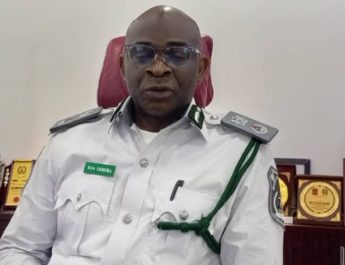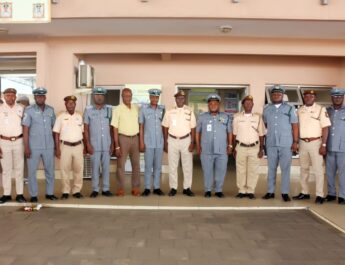For Nigeria to attain the full potential of its Marine and Blue Economy there must be concerted efforts by all stakeholders through a robust collaboration between the Public and Private entities in what experts have referred to as Public-Private Synergy (PPS)
By Edu Abade
Harnessing the full potential of Nigeria’s blue economy will largely depend on Public-Private Synergy (PPS) that extends beyond conventional PPP arrangements and embodies a developmental alliance in which government, private investors, the academics and communities will have to share responsibility for co-creating, co-financing and co-monitoring initiatives in the country’s marine and blue economy sector.
Speaking at the yearly conference of the Association of Maritime Journalists of Nigeria (AMJON) with the theme: Harnessing Nigeria’s Blue Economy Potential, Boosting Export Multimodal Cargo Transport in Lagos on Thursday, November 13, 2025, Head of Research, Sea Empowerment and Research Center (SEREC), Dr. Eugene Nweke, who doubled as Chairman of the event, maintained that PPS is not just a co-operation, but a shared governance approach built on trust, transparency and technology.
He explained that achieving the goals of Nigeria’s Blue Economy and explore the untapped value chains, the Ministry of Marine & Blue Economy outlined five key pillars for national maritime transformation including Fisheries and Aquaculture; Shipping, Ports and Logistics; Tourism and Coastal Infrastructure; Energy and Marine Resources as well as Research, Data and Governance.
In his words, “Nigeria’s fish demand exceeds 3.6 million metric tons annually, while domestic production is only 1.5 million tons, creating a 2.1 million-tons deficit worth over $1 billion in imports. PPPs in aquaculture cold-chain logistics, and fish processing can bridge this gap and create 500,000 jobs.
“Nigerian ports handle 70 million metric tons of cargo yearly, but operational inefficiencies and weak policy frame work make logistics costs 35–40 percent higher than regional peers. Integrated port automation and multimodal connectivity can save ₦3 trillion annually in trade costs.
“Only 5 percent of Nigeria’s coastline is harnessed for tourism. Developing marine leisure and cruise projects can yield US$3 billion annually. Offshore gas, renewable energy sources and seabed minerals could add US$10 billion annually if sustainably developed through PPPs. Establishing a National Maritime Data Repository (NMDR) will unify sectors data, strengthen regulation and support investment forecasting.
“The Blue Economy represents the sustainable use of ocean resources for economic growth, improved livelihoods, and job creation-while preserving marine ecosystem health. Globally, it contributes over $2.5 trillion annually and supports more than 350 million jobs (OECD, 2023).”
Nweke also pointed out that Nigeria, blessed with 853km of coastline, over 3,000 km of inland waterways and a 200-nautical-mile Exclusive Economic Zone, is strategically located as West and Central Africa’s maritime gateway, but the country’s contribution to regional maritime GDP remains below 1.5 percent, which he described as “a paradox of potential and performance.”
Restating the urgent need for PPS model, especially in the Marine and Blue Economy sector, he said the PPS is a coordinated mechanism that transforms policy frameworks into measurable economic and industrial outcomes, which conceptual framing would impact on steel, mining and agriculture with circular linkage to the blue economy.
“Nigeria’s vast scrap steel deposits offer a dual opportunity-environmental remediation and industrial rejuvenation. Properly integrated into the Blue Economy, this “scrap-to-steel circular chain” can power a new industrial age along our coastal corridor.
“Locally recycled steel can serve as raw material for hulls, decks, and dry-dock components, reducing import dependence. Steel fabrication supports safe storage tanks, jetties, barges, and marine engineering works. A structured national scrap recovery and steel reprocessing system could generate over 200,000 direct and indirect jobs.
“Regulated ship recycling and scrap recovery will curb coastal pollution and unsafe dismantling practices. Similarly, linkages with the mining and agricultural sectors can stimulate value-added processing, storage, and export logistics. Locally processed steel can feed agro-machinery fabrication, silos, and processing equipment, boosting Nigeria’s non-oil export base.
“Beyond recycled materials, Nigeria’s natural steel endowment, anchored by the Ajaokuta Steel Rolling Mill and Itakpe iron ore complex, remains a sleeping giant in our industrial landscape. Ajaokuta was originally designed to provide the heavy industrial foundation for shipbuilding, port infrastructure, rail fabrication, and offshore platforms. Decades of neglect, however, have denied Nigeria the full benefits of this strategic asset.
“Reviving Ajaokuta and aligning its production with Blue Economy objectives will guarantee domestic supply of marine-grade steel for shipyards and coastal engineering projects; Create integrated value chains linking mining, metallurgy, shipping, and logistics; Enhance export competitiveness by reducing input costs; and establish Nigeria as West and Central Africa’s marine fabrication hub,” he stated.
Also speaking, Representative of Lagos Central Senatorial District, Senator Wasiu Eshilokun Sanni, who was represented by Pastor Gbenga Oyebode, stated that harnessing Nigeria’s blue economy involves leveraging its maritime resources to boost export trade and improve multimodal cargo transport through infrastructure development, strategic planning, and policy implementation.
“Key steps include modernizing ports, upgrading inland waterways, improving road and rail connectivity, and implementing digital technologies like International Cargo Tracking Notes (ICTN) to streamline cargo movement.
“The government’s establishment of a Ministry of Marine and Blue Economy is a crucial step, but it must be supported by a clear national policy, public-private partnerships, and sustainable practices in areas like fisheries and tourism to realize the full economic potential,” he said.
Giving an insight into infrastructure development in the nation’s maritime industry, he stressed that modernization of the ports, critical investment in dredging and upgrading inland and coastal waterways to expand their use for cargo transport, improving rail and road connectivity to the ports to create efficient multimodal transport systems that connect seaports with the hinterland and dry ports and implementation of technology like the International Cargo Tracking Notes (ICTN) to improve visibility and security in the cargo supply chain, were crucial to the success of the blue economy.
In his intervention at the conference, Comptroller General of the Nigeria Customs Service, Adewale Adeniyi, who was represented by the Public Relations Officer of the Lagos Free Trade Zone Command, L.A. Abdullahi Lagos, said the NCS introduced B’Odogwu, a revolutionary home-grown Unified Customs Management System to modernize customs operations end-to-end.
“B’Odogwu is much more than a software-It is the digital backbone of a modern customs administration. It integrates key processes, Form M, PAAR, Single Goods Declaration, manifests, duty payments, and cargo release into a single, web-based platform accessible from anywhere. It also connects Customs with CBN, banks, SON, NAFDAC, FIRS and other regulatory agencies. This level of integration is unprecedented.
“Why does B’Odogwu matter? Because it directly supports Nigeria’s commitment to the WTO Trade Facilitation Agreement, the African Continental Free Trade Area, and the NCS Act 2023. These frameworks demand faster, transparent, predictable, technology-driven border procedures. B’Odogwu is Nigeria’s answer.
“The journey so far has been impressive. The system was first piloted at PTML in late 2024, where over 16,000 declarations were processed. It expanded to Apapa, Tin Can Island, Onne and strategic free zones like Lagos Free Trade Zone and the Oil and Gas corridor. Today, some of our ports and borders are fully operational on B’Odogwu.
“The outcomes are remarkable at our Ports. Beyond revenue, clearance time has dropped significantly with some stakeholders completing processes within four to eight hours when documentation is clean and compliant. The system reduces dwell time, increases transparency, and minimizes human contact. It is far more difficult to manipulate digital footprints and this strengthens compliance and accountability across the chain,” he stated.
Earlier in her welcome address, Acting President of AMJON, Vera Osokpor Nigeria is blessed with a vast coastline, abundant marine resources, and a strategic location that makes it an ideal hub for maritime trade. However, despite these advantages, our economy has remained heavily dependent on oil exports. The truth is, our blue economy has the potential to be a game-changer for Nigeria.
“The blue economy encompasses a wide range of activities, including fishing, shipping, tourism and offshore oil and gas production. It also includes emerging sectors such as renewable energy, aquaculture, and marine biotechnology. By harnessing these resources, we can diversify our economy, create jobs and stimulate growth.
“Our theme for this conference is timely, as the world is increasingly recognizing the importance of the blue economy in driving economic growth and sustainable development. With the global blue economy projected to grow to $3 trillion by 2030, Nigeria cannot afford to be left behind.
“Journalists play a critical role in shaping public opinion and influencing policy decisions. We assure you of our resolve to continue to shine a light on the opportunities and challenges in our blue economy and to hold our leaders accountable for their commitments,” she said.
A highpoint of the conference was the conferment of honours on deserving personalities in the nation’s maritime space. Those honoured include representative of Lagos Central in the Nigerian Upper Legislative Chamber, Senator Wasiu Eshilokun Sanni; Comptroller-General of the Nigeria Customs Service, the National Public Relations Officer (NPRO), Abdullahi Maiwada and the controllers of Apapa, Tin Can and Seme Commands, as well as Sylvester Othuke Egede, among others for their contributions to the nation’s maritime sector and humanity.



